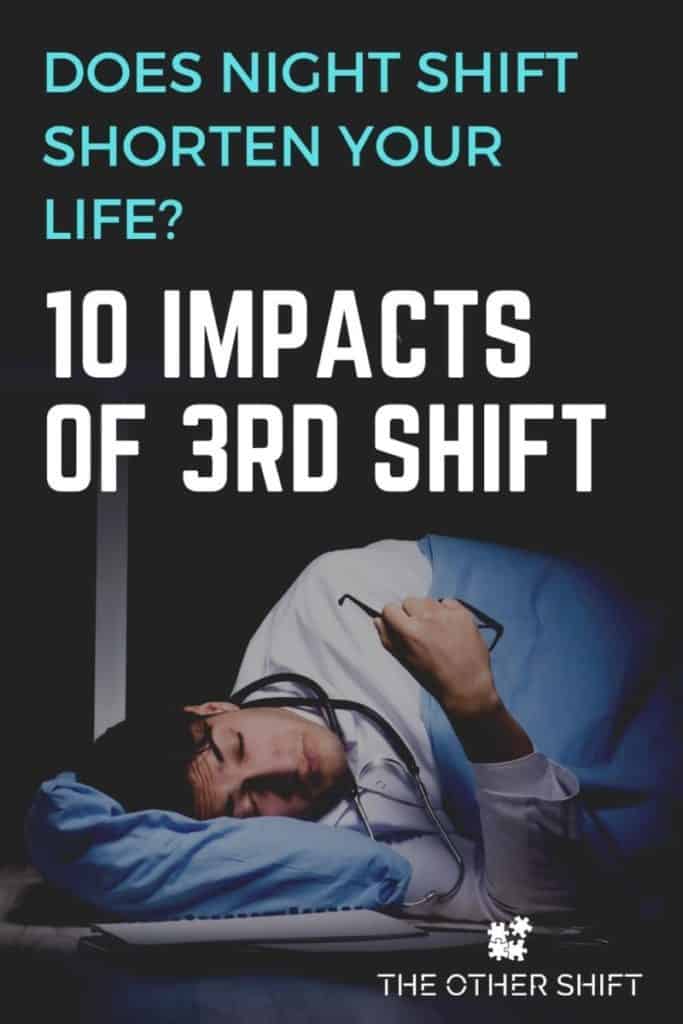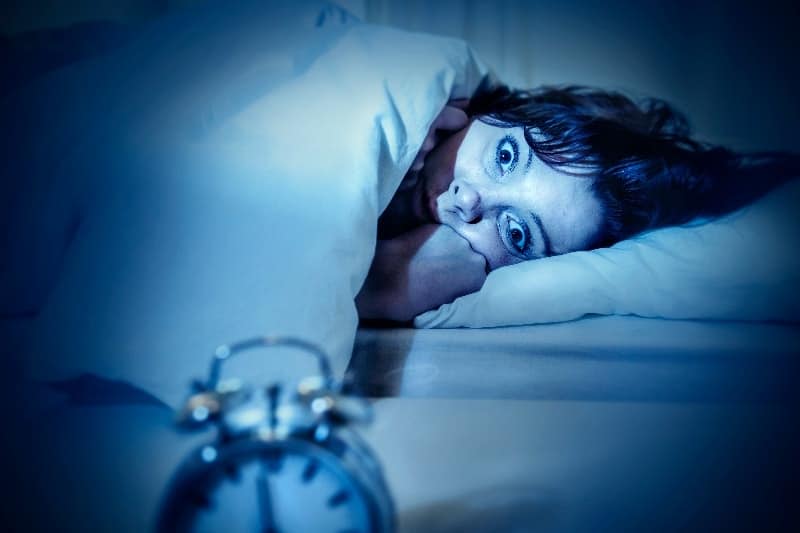We often hear that working night shift shortens your life. But is that really true? We wanted to find out what’s fact and what’s fiction, to uncover real the health truths around working night shift.
Night shift can shorten your life if you don’t prioritize sleep, consume a healthy diet, exercise regularly and make time for the things you enjoy. Though night shift does have its perks, workers are at a heightened risk of suffering sleep deprivation, weight fluctuations, depression, medical issues and accidents.
This post will uncover 10 impacts of working night shift coupled with how you can prevent them from negatively impacting your life. We hope this article provides not only clarity but gives you helpful tools you can use every day and night when on the job.
Just as a heads up, some of the health implications linked to night shift are pretty scary. But we are firm believers you can still work the night shift, be healthy and thrive. The trick is to understand (even just a little bit) how the body works and know the signs that might be telling you to slow down.
If you are interested in checking out the best blue light blocking glasses we use sleep better, you can find them by clicking here .
.
Night Shift Can Shorten Your Life
But before you freak out, all hope is not lost.
Research is suggesting night shift work can shorten your life due to the following:
- Working against what our body knows is normal and disrupting the body’s natural rhythm. This causes our body to become stressed, leading to high blood pressure, elevated heart rate and disruption of our hormones as our body tries to cope.
- Long term (chronic) sleep deprivation due to our sleep hormones, particularly melatonin, confused about the role it needs to play during the day.
- Poor sleep leads to lack of motivation to exercise and make healthy food choices. This includes the types of food we eat, but also when we eat. Our appetite also changes when we are tired leading us to crave high sugar snacks for the next energy boost.
The research also seems to conclude that the longer we work the night shift routine (and rotating shift work including days and nights), the higher the risk of being diagnosed with conditions that can shorten our life.
These health concerns are specifically Type 2 diabetes, stroke, decreased immunity, heart disease and cancer.

The World Health Organization deemed it a carcinogen in 2007 due to its repeated disruption of the body’s circadian rhythm.
If you are feeling nervous, you are not alone in this. Approximately 15-18% of the US workforce are working alternate shift schedules. (source )
)
So I hope these frightening results affecting A LOT of people lead to positive changes regarding shift structure, length and mandatory rest periods between shifts, but I guess we just have to wait and see. (source).
This article will discuss these health concerns in more detail to understand why they are the main issues and what we can do about it.
Related Posts:
- Shift work best practices: 9 Shift Work Best Practices You’re Probably Not Doing
- Myths: 9 Myths About Night Shift Jobs You Probably Still Believe
- Shift Work Sleep Disorder: Shift Work Sleep Disorder (SWSD) – What Is It and How to Avoid It?
VIDEO – Are Night Shifts Bad For You? Stop Them Ruining Your Health
1. Night Shift Can Lead to Chronic Sleep Deprivation
Sometimes sleeping during the day is tough, right? Even if you have the best blackout blinds, the most comfortable eye mask and the best pair of blue light blocking glasses, sometimes sleeping just doesn’t happen.
But unbeknown to us, as we joke about how little sleep we had before a shift to our co-workers, this lack of sleep is dangerous. Really dangerous.
It’s true our body can cope with a night or two of poor sleep and still be able to function, but any more and we are useless. And I’m sure you’ve felt it?
Productivity goes down the toilet, your moods are feisty and you struggle to concentrate for longer than a few minutes.
But how is sleep deprivation defined?
Not getting enough sleep, specifically less than 7 hours on a regular basis which starts to impact our entire body. Whereas chronic sleep deprivation is when a person is never able to catch up on the sleep they need, which can have pretty severe consequences.
But before we outline what those consequences may be, why do we need sleep?
Why Sleep is So Important:
- Sleep allows us to process the information we discovered throughout the day
- Sleep gets rid of toxins built up throughout the day or night
- It repairs injury
- Reduces stress
- Improves memory as our brain makes new connections while we sleep
- Improves coordination, balance and reaction time

So what happens when we don’t get enough sleep?
- A heightened risk of Shift Work Sleep Disorder, high blood pressure, insomnia and weight gain (which I will explain later)
- Lack of motivation to make healthy choices in regards to food, exercise, behaviors and even within your relationships.
- Unable to critically think and analyze new, challenging situations which can have negative implications on your work
- We can easily become agitated and moody in the short term but also anxious and depressed in the long term.
- Decreased sex drive which can negatively impact relationships
- Risk of diabetes as sleep changes the way our body releases insulin to break down the sugar and foods we eat
Do you believe you can function on 4-6 hours sleep a night?
You may but…About 99% of the world’s population need 7-9 hours of sleep every day. While there are a VERY few people, like 1% who can survive on less than 6 hours of sleep a night, it’s safe to assume you need more. Sorry to burst your bubble. (source)
What is the best thing we can do to sleep more as night shift workers?
Limit the amount of light you are exposed to in the 90 minutes to 2 hours before bed.
Why is this important?
As we have spoken about many times in the related posts section below, our main sleep hormone melatonin cannot perform when it senses light. It just won’t work and it doesn’t matter how tired you are either.
For a 9-5 worker, or as our body is programmed to function, melatonin “switches off” while the sun is shining and “switches on” while the sun goes down during the night.
But as night shift workers, we are asking this finely tuned clock to do the complete opposite and it doesn’t appreciate the request. But the thing is, it CAN if you give it the right tools to do its job properly.
But what are these tools? Well, there are a few we will get to in a moment but darkness is a HUGE one and something we adapt easily too.
Related post – Confronting (Yet, Often Avoidable) Night Shift Side Effects
Here is what to do after a 3rd shift and while preparing for your next set of nights.
- Make your room as dark as possible using blackout blinds or sleeping in the basement where there are potentially fewer windows
- Wear blue light blocking glasses in the 90+ minutes before bed to limit the amount of artificial light from your device or bedside lamp
- Wear an eye mask to block out any remaining light
- Charge your phone outside the bedroom and use a traditional alarm clock instead. This limits the light and distractions making the winding down process easier
- Use minimal lights while getting ready for bed such as when showering, brushing your teeth and making breakfast


Here Are Some Other Tips Not Related to the Light Which Can Help You Sleep:
- Aim to go to sleep 30 minutes to an hour (max) of arriving home. Prioritize sleep over watching excessive amounts of TV, visiting the grocery store, playing video games or scrolling social media.
- If you have kids, think outside the box in order to maximize your sleep time. Can you coordinate a plan with your spouse/partner for school pick up or mind the kids during the day? Can a neighbor help out with after school pick up? Can you discuss your roster with your manager to make “family friendly changes?”
- Find routine where possible, especially when working a rotating shift work roster including nights. Let your brain and melatonin make connections between sleep and particular behaviors like smelling lavender, listening to meditative music or taking a warm bath.
- Keep your room cool. For optimal sleep aim for temperatures between 60 and 67 degrees Fahrenheit. (source)
- Make your environment as quiet as possible by either physically changing where you sleep or from using earplugs. Find our favorites here.
- If you wake in the middle of the day, resist switching on the light. Keep those sleep hormones happy and instead either wear blue light blocking glasses or just try and relax using these weird sleep tips which actually work.
- Avoid alcohol before bed. While a beer or wine can help you fall to sleep faster it also reduces an important, restorative, information processing stage during sleep called rapid-eye-movement (REM) sleep. Although it seems harmless, you’re interfering with how the body repairs itself. (source)
- Consider using sleeping medications if you are losing your mind. Yes, we have been there. But before you just dive in, work out why you can’t sleep. What are the potential problems right now and try and find different solutions. Most of these tablets are addictive and expensive leading to more issues than when you started.
Read more about taking melatonin here and the other medications used to treat shift work sleep disorder here.
- Limit the number of times you are volunteering for extra shifts and overtime. I understand the financial benefits, wanting to help out your colleagues and feeling guilting when saying no, but if you can’t keep your eyes open, putting yourself and others at risk – what’s the point?
Related posts with helpful sleep tips:
- Guide to rotating shift work: Essential Guide To Working A Rotating Shift Schedule
- Not tired: How to Fall Asleep Quickly Even When You’re Not Tired
- Sleep music: Sleep Music Facts, Playlists and Songs for Insomnia Sufferers

2. Night Shift Can Cause Obesity
There are three big things at play here in regards to weight gain, night shift and sleep.
- Our hormones send confusing messages when we are sleep deprived making us feel hungry when we are not
- When we are tired, our body craves sugar as it wants an instant energy hit
- Our stress hormones go crazy when we work against our body clock which can lead to weight gain
Let’s dive into each of these in more detail.
1. Our Hormones Send Confusing Messages When We Are Tired
If we don’t get enough sleep, which is commonly reported by night shift workers, the chemicals which send signals telling our brain when we are “full” or “hungry” are all out of whack.
There are two hormones in particular which not only control our appetite but also play a huge role in regulating our weight, blood sugar and insulin levels to break down the food we eat.
These two hormones are:
- Leptin – Which decreases hunger by sending the “I’m full” message to our brains
- Ghrelin – Which increases hunger by sending the “I’m hungry” (or growl) message instead.
When we are sleep deprived…Our body increases the “I’m hungry” (tummy growling hormone) Ghrelin, making us want more food. But interestingly, it also decreases the level of Leptin responsible for telling us when we are full. So we are convinced to keep snacking, leading to overeating, heightening the risk of obesity.
2. When We Are Tired, Our Body Craves Sugar
Why? It knows the energy hit will be instant.
Our body is smart enough to know that the energy hit we feel after drinking soda, eating chips or enjoying some candy is much quicker than chewing on a few almonds. Our body knows the energy hit will be short-lived, but it doesn’t care because it will crave more and more until it gets it.
But the issue with overeating at night is two-fold.
Firstly, the ghrelin hormone we mentioned early which “growls” when not listened to is going completely crazy making us well…. fat and at a higher risk of diabetes and obesity, if we give in.
But secondly, eating excessively overnight to meet this craving can also wreak havoc in our digestive system too.
Metabolism slows, or at the very least changes while it’s dark outside and it’s simply not ready to process large meals like a take out pizza with extra pepperoni.
This is why digestive system issues like Irritable Bowel Syndrome (IBS), bloating, nausea, diarrhea and ulcers are commonly seen at a higher rate in night shift workers when compared to those on day shift. (source)
But on a happy note…One study regarding nurses working rotating shift work said, “these findings suggest that most cases of type 2 diabetes could be prevented by adhering to a healthy lifestyle.” (source)
3. Our Stress Hormones Go Crazy When We Work Against Our Body Clock
And the issue with being stressed in regards to weight gain is:
- We burn less fat when we are stressed
- When our bodies are stressed it wants to burn more sugar and glucose rather than fat
- When we are stressed it changes the way our thyroid, other glands and our cortisol (our stress hormone) work together. This can lead to weight gain. (source)
Healthy solutions for night shift workers to prevent obesity:
- Fight the cravings and prioritize protein over carbs and sugar during a shift. The energy hit will be more sustained keeping you feeling fuller for longer.
- Be aware that your hormones are sending you mixed, confusing messages so don’t give in. Eating filling, high protein snacks should be your go-to overnight and what’s inside your lunch box.
- Make time to meal prep and organize your homemade, nutritious meals and snacks and limit bringing coins to work which you can easily feed into the vending machine
- Eat your “main meal” before you leave for a shift
- Stop drinking (and eating) caffeine 5-6 hours before bed. Instead, switch to water or decaffeinated hot drinks like juice or coconut water
- Eat a small, filling breakfast after a shift but avoid coffee and alcohol
- Take control of the things causing you stress. Talk about it with your support system and make positive changes
Is there a recommended shift work diet? You could argue simply sleeping more can help you lose weight. It helps you regulate your hormones much better in a less stressed environment, without having to attempt keto or try intermittent fasting. (though such diets have helped many in our night shift community).
Related posts with helpful diet tips:
- Meal Prep Tips: 12 Valuable Meal Prep Tips For Busy Shift Workers
- Meal timing: When Should I Eat On Night Shift?
- Intermittent fasting: Should I Eat On Night Shift? Why Intermittent Fasting Works
- Meal Ideas: 6 Healthy, Freezable Shift Work Meal Ideas For Beginners
- Weight loss: How Can I Lose Weight Working 12-Hour Night Shifts?

3. Night Shift Can Cause A Higher Rate of Depression
Recent studies have confirmed what we probably have felt or joked about in good faith at one point or another while working night shift.
“Night time shift work does increase the risk of depression“ but the research is not strong enough yet “to sustain a general medical recommendation against shift work for employees with depressive conditions“. (source)
Its also been researched that working the night shift increases the risk of developing aggravating mood disorders in vulnerable individuals. But in the same study, they also said the depressive symptoms could be actually linked to the job and not the hours. (source)
Here are some of the depressive symptoms reported by night shift workers:
- “Lifeless” and “like a ghost”
- “Out of touch” with the world but particularly with close intimate relationships
- Stressed due to lack of sleep and “missing out on life”
- Moody and reactive
- Poor concentration leading to a decreased ability to critically think through a problem
Here are some healthy ways to improve the psychological effects of working night shift:
- Focus on you. Make time for the activities you enjoy like walking your dog in the sun, seeing your friends and playing with your kids. If you notice you’re in a “slump” make positive changes.
- Be smart with your roster. Know the lockout dates, request where possible and seek help if your roster is impacting your mental health
- Work with your family and friends making the most of non-traditional time together. Have an open schedule, communicate what’s bothering you and share the load (housework, meal prep and bills). Also maintain rituals you love such as date night and reading with your kids.
- Book events and activities ahead of time to give yourself something to look forward to.
- Prioritize sleep to give yourself the brainpower to overcome adversity. If you’re having difficulties sleeping find out why and explore a solution.
- Weigh up the pros and cons of your current job and night shift situation. Make changes if one column outweighs the other
- Establish a strong rapport with your doctor, psychologist or therapist and attend regular appointments
Related posts with helpful tips:
- Bored: Bored On Night Shift? How To Stay Busy Without The Internet
- Marriage and night shift: Night Shift Is Killing My Marriage. How To Stop It Happening
- Preventing Illness: 10 Night Shift Survival Tips to Stay Healthy and Not Get Sick
- New nurse sickness: Always Sick as a New Nurse? 10 Tricks to Beat The Blues

4. Working Night Shift is Linked to Cancer
Pardon? How can simply working a night shift job cause me to get that sick?
Here are some key points I found in my research:
- In 2007, the International Agency for Research on Cancer classified shift work that involves circadian disruption as “probably carcinogenic to humans,”. Research has gone crazy since.
- That research has found night shift workers have an increased risk of developing breast cancer, colorectal cancer, prostate cancer, digestive system cancer and lung cancer (source).
- They believe the link between cancer and night shift is due to long-term circadian disruption and our bodies being in a state of constant stress (source).
- From the oodles of research I reviewed, the blame gets pointed at long term night shift work of 15-20+ years as a risk factor for developing cancer.
What can we do to actively limit our risk of cancer while working night shift?
- Limit the amount of sleep debt you experience by prioritizing sleep after a shift and on your days off
- Find routine where possible and limit switching from one schedule to another too often (or at all)
- Decrease the length of your shifts where possible, avoiding 16 hours shifts at all costs, regardless of the financial incentives.
- Always take your breaks during a shift and even take some time outside to yourself
- Maintain regular health checks with your doctor and be proactive when something doesn’t feel right
- Avoid long term night shift over 15 years if possible despite being in a “routine”
Related posts with helpful tips:
- Swing shift: What’s A Swing Shift? 5 Essentials To Managing This Schedule
- Surviving night shift: 8 Useful Hacks For Surviving Night Shift With No Sleep

5. Working Night Shift Can be Bad For My Heart
Again, unfortunately, night shift work can be blamed for causing heart issues. This includes high blood pressure, developing clots, sleep apnea and an increased risk of heart attacks.
It’s important to keep in mind though that these issues also affect those working day shift and 9-5 workers who live an unhealthy lifestyle. And sometimes even the healthiest of people have heart issues.
But the difference is night shift workers are working against our body clock. This causes issues we have explained throughout this post that these other two groups typically don’t experience.
The other reasons researchers currently conclude night shift workers are at a higher risk of health issues are:
- Night shift causes changes in blood pressure and circulation as the hormones and chemicals inside our bodies are trying to find a new “normal”
- Poor meal choices and overeating leads potentially to a build-up of cholesterol and fatty tissue making it harder for the heart to pump oxygen around the body.
- Lack of sleep leads to increased stress on our body systems
What can we do to improve our hearts health while working night shift?
- Eat heart-healthy foods like – green leafy veggies, whole grains, berries, avocados, fatty fish and walnuts
- Focus on eating the fruits and veggies during a shift which you have prepared, not the vending machine or take out on the way home
- Strive to lose weight if you have an elevated BMI (Body Mass Index) or carry around extra pounds
- If possible, decrease the shift time duration and volunteer for shorter shifts. This was a red flag in the studies leading to a higher rate of heart issues (source).
- Exercise daily. Despite sometimes limited motivation, find a routine that works. Yoga, swimming, a brisk walk, a local game of basketball or a class at gym are great places to start. I jump rope because it’s quick and over before I know it.
Related posts with helpful “heart-friendly” tips:
- Exercise after night shift: Sleep or Workout? What Should I Do After Night Shift?
- Weight loss foods: 15 Best Foods for Weight Loss on Night Shift
- Home gym: Best Equipment Ideas for Your Home Gym 2019

6. There Is a Higher Chance of Having a Stroke When Working Night Shift
The research specifically points to those individuals working a rotating shift work roster rather than a permanent night shift schedule.
It seems the longer you work a rotating shift work schedule, the risk of having a stroke increased significantly, but the same cannot be concluded for permanent night workers.
Why is rotating shift work a negative here?
When working the night shift, our body is under stress working against what it knows is normal.
This means the body needs to fight harder in order to maintain balance, fight intruders (such as illness and disease) and pump oxygen around the body.
This is made even worse when we are sleep deprived, which is more common when working a rotating shift work schedule, due to short change periods and disruption in sleeping patterns.
Healthy tips for night shift workers to prevent a stroke:
- Actively try to lower your blood pressure if it’s high. Take your medications regularly, exercise daily and eat a healthy diet (source
 )
)
- If you have diabetes, stay on top of it. Treat your sugar and eat the diet recommended for you from the doctor or diabetes counselor.
- Drink alcohol in moderation and give up smoking. (If struggling, try hypnosis. Daniel’s dad had great success with this)
- If working rotating shift work, maximize the time between night and day shift to allow you body to adjust and sleep.
Related posts with helpful, healthy tips:
- Jump rope: 8 Impressive Jump Rope Benefits to Get That Killer Body
- Alcohol: Is Surviving Night Shift with a Morning Beer a Good Idea?
- Exercise: Top 5 Exercise Tips For The Time Poor Shift Worker

7. Night Shift Workers Have a Heightened Risk of Getting Sick
And sleep deprivation is generally to blame, again.
When we haven’t had enough sleep it weakens our immune response and how well our bodies can stand up to an intruder, even the common cold.
The germs found in hospitals, public places and kids play centers can normally be easily fought against with good sleep and a strong immune system.
But this is not so easy for night shift workers struggling to sleep during the day.
It’s also especially challenging for those people who have been struggling to sleep for a long time, and not just for a few days.
The other potential contributing factor is that night shift workers may not be processing the foods they eat properly. By eating at strange times it throws our digestive system in a tizz, meaning some of the nutrients are lost or stored differently.
By having a decreased immune system linked to sleep debt, night shift workers are at risk of:
- Catching the common cold more often
- The flu
- Autoimmune diseases
- Heart (cardiovascular) and digestive (metabolic) disorders
- Cancer (source)
Healthy tips to prevent night shift workers getting sick easily:
- Increase the amount of healthy fruits and veggies in your diet – even when feeling well
- Limit excessive exercise when feeling unwell
- If you’re feeling tired and “under the weather” avoid high-risk places like hospitals, indoor public events, airports, schools (source).
- Stay hydrated with a ton of water

8. Higher Rate of Workplace Injuries and Errors on Night Shift
When everyone has slept well and feeling alive, the risk of workplace accidents are minimal. However, we know this is not always the case.
Without proper sleep, our balance, decision making, coordination and reaction times are all impacted – and not in a good way.
And for the shift workers whose job requires delicate decision making, this can be pretty dangerous. I am talking about pilots, nurses, doctors, police, fireman, air traffic controllers and truck drivers just to name a few.
Here is a snap-shot of what I found in the research:
- There is a higher rate of on-the-job injuries for rotating shift workers in factory settings.
- More “near misses” seemed to occur on night shift but this could be due to under-reporting during the day.
- There is a high rate of accidents for longer shifts than shorter ones.
- The rate of accidents seemed to increase with the number of night shifts worked.
Good to know…Our body naturally starts to “shut down” when we are tired, “turning off” critical functions like our level of alertness and mobility. We can force these functions to “stay on” as most night shift workers do, but this leads to a decrease in focus, attention and fine motor skills. (3,4)
During the shift is one concern, but what about traveling home?
The risk for night shift workers heightens again when we put ourselves behind the wheel of a car. Being awake for 17-19 hours is the same as being drunk and why fatigue is blamed for a huge percentage of car accidents. (source)
If you’re anything like me, I tend to misjudge how tired I really am, thinking I am capable of making good decisions, when in fact I’m no better than the guy at the bar. We tend to overestimate how alert we are, leading to more mistakes and accidents.
Tips to prevent workplace injury and ensure safety on night shift:
- Keep the lights on in your direct work area and leave them on throughout the entire night. However, remember to minimize this light in the 1-2 hours before bed.
- If you have had less then 4 hours of sleep consider calling in sick. The health risk for you and others are not worth it
- Use your break to nap for either 20 minutes or 90 minutes, nothing in between. But don’t take these naps too close before you need to sleep after a shift
- Eat and drink energy-boosting, healthy items instead of processed foods. Never rely on energy drinks!
- If you’re feeling exhausted have somebody check your work and don’t rush into making a big decision you are not 100% sure about.
Related Posts
- Driving advice after a shift: How To Stop Falling Asleep While Driving After Night Shift
- Sleep before a shift: How Long Should You Sleep Before A Night Shift?
- Energy-boosting drinks on night shift: What Should I Drink On Night Shift? 10 Energy

9. Night Shift Diminishes Vitamin D Levels
(If you don’t expose yourself when the sun is shining).
There are three ways we can get enough vitamin D to support healthy bone and cell growth, whilst also preventing disease / illnesses we have spoken about in this post like cancer, depression and heart disease:
- Sun
- Food (cheese, yogurt, tofu and salmon)
- Vitamins
While there are three ways to get enough vitamin D, the best way is through getting out in the sun. But I know when working nights, this is easier said than done.
- After waking from sleep in the afternoon, open the blinds and spend time outdoors. Go for a walk, take your dog for a stroll and enjoy having dinner outside
- On your days off, enjoy time in the sun – work in the garden, exercise outdoors or even just sit and read a book in the yard
- If working rotating shift work, enjoy your breaks outdoors in the sun
Related Posts:
- Night shift transition guide: How Long Does It Take To Adjust To Night Shift?
- Skin: Best Skin Care Regimen and Products for Night Shift Workers
- VIDEO: What To Do When Working Multiple Night Shifts In A Row
10 – Night Shift Is Bad Even If I Am Not Sleep Deprived
Since commencing my nursing career 10+ years ago as a rotating shift worker, I have rarely needed to take sick leave. I slept pretty well after installing blackout blinds, wearing blue light blocking glasses and using a variety of other sleep aids.
But did I feel more “alive” and productive in comparison to working days? No.
I believe we can only do the best we can when working nights and for most that is aiming to sleep more, eat better and fit in regular exercise.
But at the end of the day, we have not evolved into shift working machines. We are not programmed to sleep during the day and eat at night. Regardless of what we do, our body’s do suffer from an added level of stress.
So you can label this “unhealthy” as it’s not natural and strive to do everything you can for the situation you’re in.
Bottom line: Night shift can work brilliantly for some people; tying in perfectly with their work and family situation. Avoiding the traffic, enjoying a slower pace, dealing with fewer people and earning extra money make this schedule all worthwhile. But we need to be aware of what the schedule is actually doing to our body and take an active role in trying to make it better.
VIDEO: Sleep scientist Dr Chris Harvey summarises what I have said throughout this post. Towards the end of the video at about the 6-minute mark, he gives some great tips to help overcome the struggles of night shift work.
The blue light blocking glasses he talks about we love and wear every single day – even on day shift. See which pairs we wear here via our recommended shift work tools page and why.
Summary: Does Night Shift Shorten Your Life? 10 Impacts of 3rd Shift
For most of us, working night shift is unavoidable. So it’s important not to place your head in the sand and take an active role in making the situation as good as it can be.
You won’t only feel better for it, but your friends and loved ones will enjoy the new and improved you too!
Just before you go, I heard rumours about the night shift being linked to people’s hair falling out and needed to investigate ASAP – here is what we found.
Cheers,

Disclosure: This page may contain affiliate links, meaning we receive a commission if you decide to make a purchase through our links, but this is at no additional cost to you. Please read our disclosure and privacy statement for more info.


